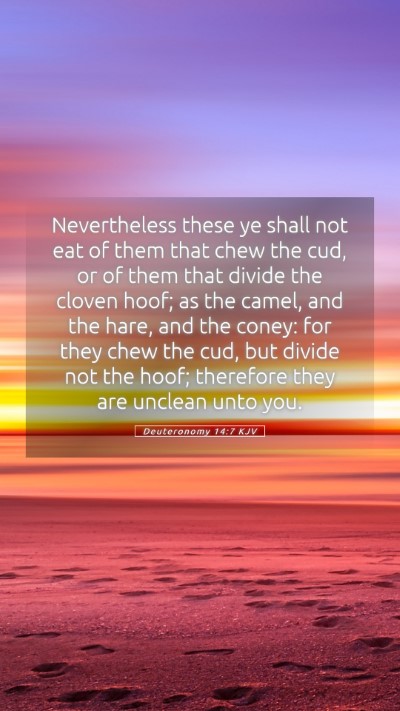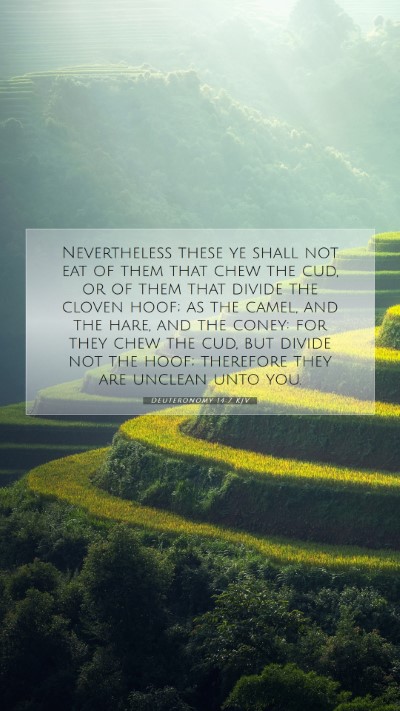Understanding Deuteronomy 14:7
Bible Verse: Deuteronomy 14:7 - “Nevertheless these ye shall not eat of them that chew the cud, or of them that divide the cloven hoof; as the camel, and the hare, and the coney.”
Summary of the Verse Meaning: This verse belongs to a section of the Mosaic Law concerning dietary restrictions imposed on the Israelites. It outlines specific animals that are deemed 'unclean' and, therefore, prohibited from being consumed. The inclusion of animals like the camel and the hare indicates a categorization based on distinctive attributes pertaining to their physical characteristics and behaviors. This encapsulation of cleanliness reflects broader themes of holiness and separation from pagan practices.
Bible Verse Interpretations
Commentators such as Matthew Henry emphasize the spiritual implications of adhering to these laws, suggesting that they served to remind the Israelites not only of their distinct identity but also of their dependence on God for purity and holiness. Similarly, Adam Clarke elaborates on the concept of distinguishing between clean and unclean animals as a means of guiding the community's moral and spiritual direction. Albert Barnes notes that these laws also educated the nation regarding health and symbolic sanctity.
Insights from Commentaries
- Matthew Henry: Highlights the necessity of maintaining holiness through dietary laws, understanding these restrictions as divinely intended to separate God's people from worldly practices.
- Adam Clarke: Discusses the symbolic meaning behind clean and unclean animals, suggesting the hidden lessons about obedience and the significance of living righteously.
- Albert Barnes: Emphasizes that these laws reflect God's order in creation and serve a dual purpose in ethical and health considerations for the Israelites.
Meaning of Bible Verses
The broader context of Deuteronomy 14 reveals a theme of holiness where God's people are called to live distinctly different lives. The specific prohibitions in this verse serve to remind us about the importance of obeying God's commands and the need for discernment in what we consume, both physically and spiritually.
Historical Context of Bible Verses
The dietary laws, including those found in Deuteronomy, were set within a context where God was establishing a covenant with Israel. These laws served both to differentiate the Israelites from surrounding nations and to teach them about obedience and the nature of God’s holiness. Understanding this historical backdrop is crucial for in-depth Bible verse analysis and can enhance the application of these teachings in modern life.
Applying Bible Verses to Daily Life
The principles behind dietary laws can be applied to modern believers by considering what we 'consume' spiritually. Just as certain foods were off-limits to maintain physical cleanliness, so too are there teachings in Scripture that guide us toward spiritual health and unity with God's intent for our lives.
Related Bible Cross References
- Leviticus 11: A detailed account of the clean and unclean animals.
- Numbers 18:15-16: Further explains the laws regarding clean animals.
- Isaiah 66:17: Mentions the fate of those who consume unclean things.
Conclusion
Deuteronomy 14:7 serves as a reminder of the importance of spiritual discernment and holiness in the life of a believer. Through the insights provided by various biblical commentators, one can gain a deeper understanding of how these dietary laws apply not only in the historical context of Israel but also in contemporary life, informing our spiritual journey and decisions.


